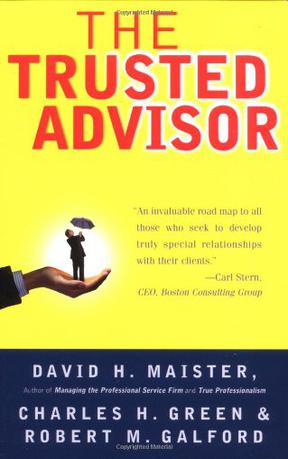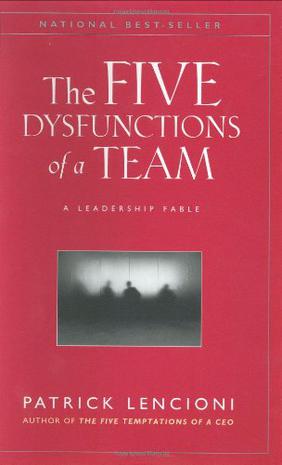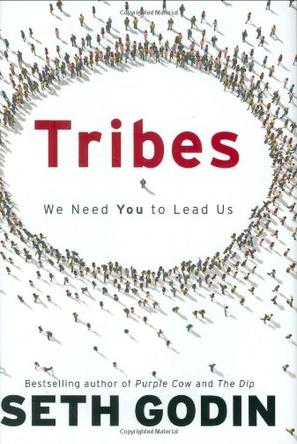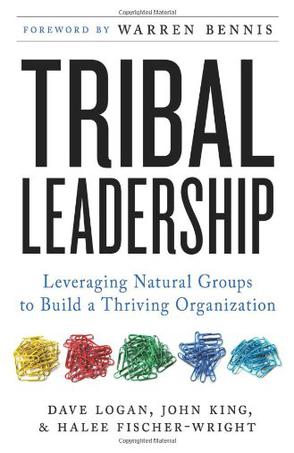-

FYI
-

The Trusted Advisor
在线阅读本书 In today's fast-paced networked economy, professionals must work harder than ever to maintain and improve their business skills and knowledge. But technical mastery of one's discipline is not enough, assert world-renowned professional advisors David H. Maister, Charles H. Green, and Robert M. Galford. The key to professional success, they argue, is the ability to earn the trust and confidence of clients. To demonstrate the paramount importance of trust, the authors use anecdotes, experiences, and examples -- successes and mistakes, their own and others' -- to great effect. The result is an immensely readable book that will be welcomed by the inexperienced advisor and the most seasoned expert alike. -

The Five Dysfunctions of a Team
在线阅读本书 In The Five Dysfunctions of a Team Patrick Lencioni once again offers a leadership fable that is as enthralling and instructive as his first two best–selling books, The Five Temptations of a CEO and The Four Obsessions of an Extraordinary Executive. This time, he turns his keen intellect and storytelling power to the fascinating, complex world of teams. Kathryn Petersen, Decision Tech′s CEO, faces the ultimate leadership crisis: Uniting a team in such disarray that it threatens to bring down the entire company. Will she succeed? Will she be fired? Will the company fail? Lencioni′s utterly gripping tale serves as a timeless reminder that leadership requires as much courage as it does insight. Throughout the story, Lencioni reveals the five dysfunctions which go to the very heart of why teams even the best ones–often struggle. He outlines a powerful model and actionable steps that can be used to overcome these common hurdles and build a cohesive, effective team. Just as with his other books, Lencioni has written a compelling fable with a powerful yet deceptively simple message for all those who strive to be exceptional team leaders. -

Tribes
A tribe is any group of people, large or small, who are connected to one another, a leader, and an idea. For millions of years, humans have been seeking out tribes, be they religious, ethnic, economic, political, or even musical (think of the Deadheads). It’s our nature. Now the Internet has eliminated the barriers of geography, cost, and time. All those blogs and social networking sites are helping existing tribes get bigger. But more important, they’re enabling countless new tribes to be born—groups of ten or ten thousand or ten million who care about their iPhones, or a political campaign, or a new way to fight global warming. And so the key question: Who is going to lead us? The Web can do amazing things, but it can’t provide leadership. That still has to come from individuals— people just like you who have passion about something. The explosion in tribes means that anyone who wants to make a difference now has the tools at her fingertips. If you think leadership is for other people, think again—leaders come in surprising packages. Consider Joel Spolsky and his international tribe of scary-smart software engineers. Or Gary Vaynerhuck, a wine expert with a devoted following of enthusiasts. Chris Sharma leads a tribe of rock climbers up impossible cliff faces, while Mich Mathews, a VP at Microsoft, runs her internal tribe of marketers from her cube in Seattle. All they have in common is the desire to change things, the ability to connect a tribe, and the willingness to lead. If you ignore this opportunity, you risk turning into a “sheepwalker”—someone who fights to protect the status quo at all costs, never asking if obedience is doing you (or your organization) any good. Sheepwalkers don’t do very well these days. Tribes will make you think (really think) about the opportunities in leading your fellow employees, customers, investors, believers, hobbyists, or readers. . . . It’s not easy, but it’s easier than you think. -

What Got You Here Won't Get You There
America’s most sought-after executive coach shows how to climb the last few rungs of the ladder The corporate world is filled with executives, men and women who have worked hard for years to reach the upper levels of management. They’re intelligent, skilled, and even charismatic. But only a handful of them will ever reach the pinnacle -- and as executive coach Marshall Goldsmith shows in this book, subtle nuances make all the difference. These are small "transactional flaws" performed by one person against another (as simple as not saying thank you enough), which lead to negative perceptions that can hold any executive back. Using Goldsmith’s straightforward, jargonfree advice, it’s amazingly easy behavior to change. Executives who hire Goldsmith for one-on-one coaching pay $250,000 for the privilege. With this book, his help is available for 1/10,000th of the price. -

Tribal Leadership
The authors, management consultants and partners of JeffersonLarsonSmith, offer a fascinating look at corporate tribes—groups of 20–150 people within a company that come together on their own rather than through management decisions—and how executives can use tribes to maximize productivity and profit. Drawing upon research from a 10-year study of more than 24,000 people in two dozen organizations, they argue that tribes have the greatest influence in determining how much and what quality work gets done. The authors identify the five stages of employee tribal development—Life sucks, My life sucks, I'm great and you're not, We're great and Life is great—and offer advice on how to manage these groups. They also share insights from the health care, philanthropic, engineering, biotechnology and other industries and include key points lists for each chapter. Particularly useful is the Tribal Leader's Cheat Sheet, which helps determine and assess success indicators. Well written and enlightening, this book will be of interest to business professionals at all levels. (Feb.) Copyright © Reed Business Information, a division of Reed Elsevier Inc. All rights reserved. "[T]he most thorough and unique book to come along pertaining to organizational dynamics in quite some time....Whether you’re trying to move an organization forward or trying to move forward yourself, Tribal Leadership is a great place to begin your efforts. "[A]n unusually nuanced view of high-performance cultures. . . . [S]hare the book with your Type A’s and prima donnas, as it expertly describes the tension between loners who perform exceptionally and those who perform exceptionally but who measure success as part of a team." "Leaders of both for profit and non-profit organizations, including politicians, and can benefit from perusing Tribal Leadership."